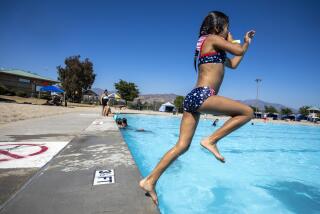Shared Swimming Pools Can Be Fertile Ground for Sickness
- Share via
Despite all their antiseptic, eye-stinging chlorine, and their summertime wholesome appearance, public swimming pools are still shared water--and increasingly efficient spreaders of disease, according to a new report from the federal Centers for Disease Control and Prevention.
Through the 1990s, outbreaks of diarrhea originating at pools, water parks and other watery recreation spots have increased gradually, hitting some 10,000 people overall and peaking in 1997-98, when there were a record 10 outbreaks, the report said. The most frequent cause: “stool accidents,” the CDC researchers said. Swimmers already carrying a bug, many of them children, can expose just about everyone else in the drink.
In a separate analysis of 47 pools, fountains, and other splashing spots, done in 1999, the CDC found that the bug Giardia was the most common contaminant, found in about 4% of samples. Giardia is a microscopic parasite that can live for up to an hour in chlorinated water, and a dose of it can quickly double you over with diarrhea.
The agency recommends that, in addition to following the rules at the local swimming hole, we take a few more precautions: take the kids for regular bathroom breaks; wash them (and your own hands) before returning to the pool; and don’t swim when you have diarrhea.






